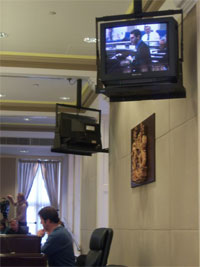 |
| Halifax Student Alliance chair Mitch Gillingwater appears on the monitor as Mayor Peter Kelly presides over the Mayor's Roundtable on Violence on Saturday. |
When Tara Gault returned to campus from downtown Halifax one Sunday evening in the summer, she came across an ugly sight just as she neared the Computer Science Building. Eight to 10 university-aged people, some wielding baseball bats and pieces of wood, were fighting. An argument had got out of hand.
“It was very upsetting to witness,” says Ms. Gault, vice president (education) with the Dal Student Union. She’s scheduled to testify in court about the incident in January. “It really brought home for me that violence is here in Halifax, and it’s here on campus.”
Concerned that their views on crime and public safety are being missed, students pushed to have their say in front of the Mayor’s Roundtable on Violence. They formed the Halifax Student Alliance, a municipal lobby group comprised of students from Dalhousie, Saint Mary’s, Mount Saint Vincent and Nova Scotia Community College.
“Students form a major stakeholder group that was neglected,” says Mike Tipping, DSU president. “Getting on the agenda was the first thing.”
HRM city council started doing its research in May by asking more than 1,200 residents about violent crime. By doing so, it missed out on the views of students, many of whom had gone home for the summer.
So the Halifax Student Alliance did its own research. On Saturday, alliance chair Mitch Gillingwater, president of Saint Mary’s student association, presented the results of a survey to the mayor’s roundtable. Conducted between October 22 and November 13, the survey asked students about their perception of crime; if they feel safe walking alone after dark; their preferred mode of transportation after going out at night; and if they had personally experienced crime, including vandalism, theft, fraud, swarming and sexual assault.
Survey says ...
Conducted online, and communicated by a mass email and on Facebook, 1,260 students completed the survey. Seventy-eight per cent were Dalhousie students; 71 per cent were students from out of province or out of country; and 69.2 per cent were women.
Mr. Tipping says the survey turned up some surprising and troubling results. For example, eight per cent of female respondents say they have been victims of sexual assault. Forty-six per cent of respondents reported witnessing a crime.
The respondents’ perception of crime — whether they thought Halifax has a high, average or low amount of crime — was directly affected by whether they had been personally affected. Those who were victims of crime tended to think Halifax had a lot of crime, while those who had no experience of crime said Halifax had low to average levels of crime and felt safe.
Survey results also seemed to indicate a lack of trust in Halifax Regional Police, to the point where 62 per cent of respondents who experienced crimes such as sexual assault, assault and stalking didn’t report them to police.
Other municipal issues
But there may be other ways to interpret the data. Ms. Gault, who witnessed the summer brawl, said she made a point of giving a statement to police about what she saw. But perhaps the other crimes being witnessed or experienced aren’t as severe.
The results of the survey means members of the Halifax Student Alliance are going to have to roll up their sleeves “and see what actual solutions we can find for students,” says Mr. Tipping. He adds the alliance will also delve into other municipal issues affecting students, such as pressing for a safer crosswalk for Mount Saint Vincent students who dodge the traffic of the Bedford Highway and seeing if ferry service could be extended to Nova Scotia Community College’s new waterfront campus in Dartmouth. He adds that students who live off-campus need support in their dealings with the Residence Tenancy Board, “which is biased in favor of landlords.”
“We focus on provincial and federal issues all the time, but there are huge issues that affect students where they live everyday,” he said.
See:
- "Campus security" in The Coast
- "25 per cent of students think it’s futile to report crime" in The Daily News
Links:
Join the discussion: Do you feel safe?
